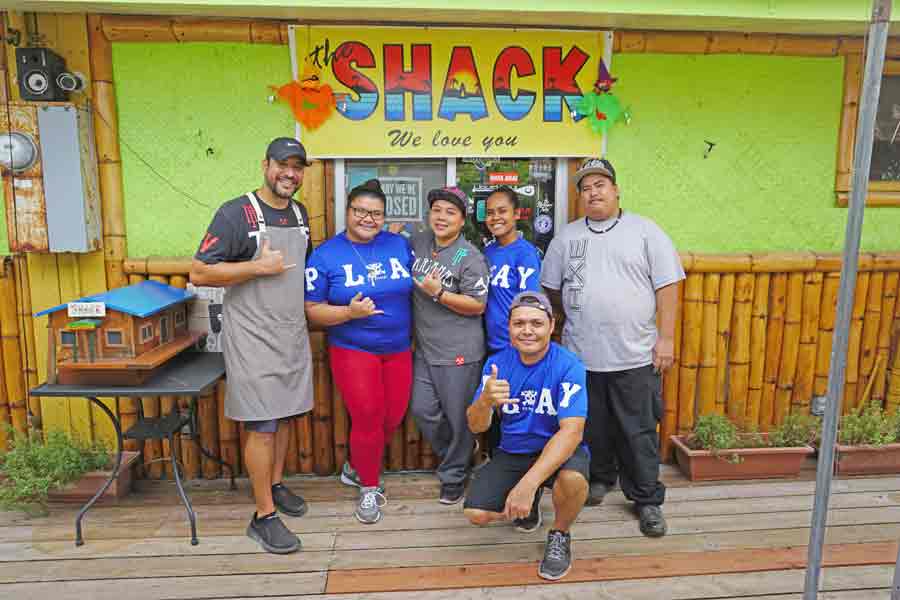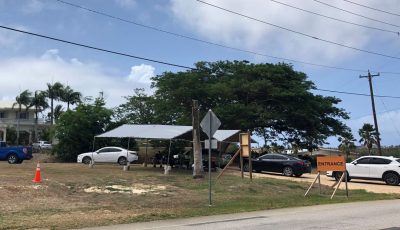The Shack Saipan thrives on sustainability

From Left: Glen Hunter, Izza Camacho, Nina Kaipat, M.J. Sikelbert, Sid Romolor, and Henry Worswick. “We are blessed to have this team that love what they do, enjoy themselves at work and it shows in the way they treat our customers and are not afraid to give,” Hunter said. (Bea Cabrera)
Glen Hunter, who co-owns The Shack with his family, has a very specific idea of how he wants their customers to feel.
“Growing up, our house always had an open door,” he said. “My mom always welcomed everybody, she loved people with food, and she’s the role model in mind in developing this place.”
That’s the vibe he wants The Shack to have—a feeling of being at home that you let your guard down and loosen up.
His mom, Gloria herself, is a fixture at The Shack. Some days, she helps out the wait staff. That adds to the place’s homelike ambiance.
“We definitely want people to feel like they walked into someone’s home and that they are a welcome addition to someone’s home like they walked in to my mom’s house,” said Hunter.
That relaxed and intimate ambiance is on top of the philosophy that drives The Shack, which is the concept of “thriving on sustainability.”
Hunter said he grew up thinking that food or anything for that matter shouldn’t go to waste and that also applies to The Shack since its establishment five years ago.
“What we try to do is to try to lead by example. There’s a Gandhi quote that I truly believe in—‘Be the change that you want to see in the world—and that is the way we try to run the company. It’s not a philosophy about one aspect. It is across-the-board in the way we treat our customers, the environment, the way we treat our food, the way we treat our co-workers,” Hunter said.
Thriving on sustainability is also the best way they know to help with the environment.
“On the food side, we try to go as local as possible. There are some challenges, that’s why we keep a flexible menu and we try to incorporate as many local ingredients as possible. We integrate imported items when we have to. But what that does is it allows us to purchase items directly from farmers out here,” he added.
The Shack uses about 60 to 100 lbs of bananas weekly. It sources this item directly from the islands’ farmers.
“I’ve heard other restaurants say that that they can’t utilize local farmers too much because of consistency as they need the items religiously every week. We like consistency but we don’t require it. We alter our menu to adapt. So during dragon fruit and pineapple season, we will incorporate them into the menu. If it’s out of season, we won’t,” Hunter said.
Another influence that Hunter practices is limiting The Shack’s food waste.
“This is something that has been drilled into my head by my mother growing up that you don’t waste food,” he said.
When the restaurant does have food waste, these are given to farmers as food for pigs.
“That way we provide food for animals so that can go back to the community for food purposes,” Hunter said.
The restaurant also saves its coffee grounds and spent tea and gives them to the Northern Marianas College-Cooperative Research Extension & Educational Services for composting purposes.
“CREES came back and dropped off cucumbers that came from the compost that we are giving them. Now they are looking at us to test their crops and find out how they work, how customers enjoy them, and see the quality so they can also teach other farmers the process that they are doing,” he said.
Being sustainable is synonymous to being a strong community partner. The Shack donates to causes that champion sustainability, whether it’s the Green Gala of the Micronesia Islands Nature Alliance or anything of that nature.
“For disposables, we get the compostable and eco-friendly ones. They are made out of plant products like sugar cane. In that way, they are safer for the environment and can be composted,” he said.
Sustainability is also about not creating eyesores and messes that are unattractive to the environment and harm rather than help.
The building itself that houses The Shack is an example. “It was kind of an abandoned space. It was a beautiful little flower shop but it has been closed for almost a decade. So grass have grown around it and right by the roadside it was an eyesore—two container buildings that were unused and unutilized.”
The Shack also provides a venue for local events like poetry nights, arts, meetings, and other activities that encourage small groups to be active and do something worthwhile.
Five years into the business, The Shack is still in its infancy but it aims to continue to grow with the changing times and how to be sustainably effective in small doses.
“The Shack is definitely organically grown as far as the philosophy is concerned. We see areas that we can better ourselves, we definitely strive toward it, and everyday we try to do a little bit more. Our goal is to always be a little bit better than we were the day before,” Hunter said.
“That’s our philosophy in all things—in the way we treat the community, our customers, and the way we produce our food. We are not competing with anybody else in town, we are just competing with our yesterday’s self so that’s all we continuously do and strive for,” he added.



























